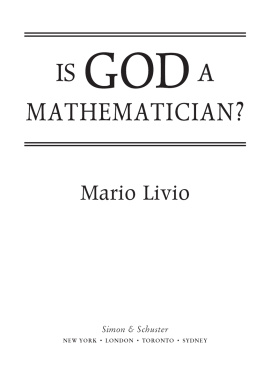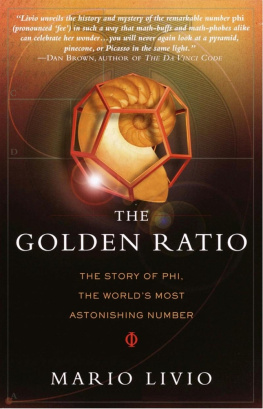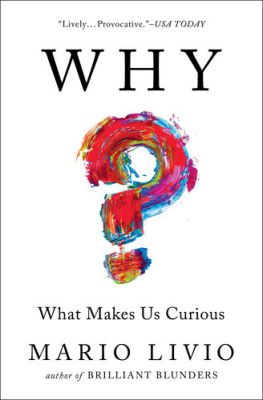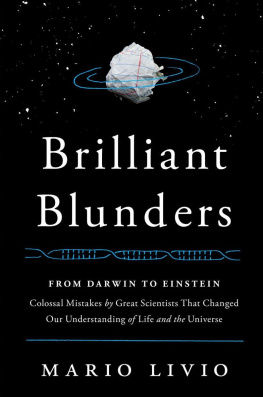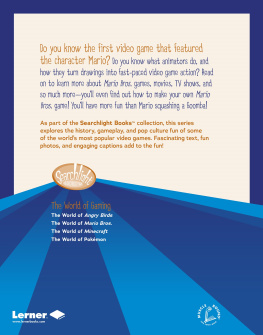Mario Livio - Is God a Mathematician?
Here you can read online Mario Livio - Is God a Mathematician? full text of the book (entire story) in english for free. Download pdf and epub, get meaning, cover and reviews about this ebook. year: 2010, publisher: Simon & Schuster, genre: Religion. Description of the work, (preface) as well as reviews are available. Best literature library LitArk.com created for fans of good reading and offers a wide selection of genres:
Romance novel
Science fiction
Adventure
Detective
Science
History
Home and family
Prose
Art
Politics
Computer
Non-fiction
Religion
Business
Children
Humor
Choose a favorite category and find really read worthwhile books. Enjoy immersion in the world of imagination, feel the emotions of the characters or learn something new for yourself, make an fascinating discovery.
- Book:Is God a Mathematician?
- Author:
- Publisher:Simon & Schuster
- Genre:
- Year:2010
- Rating:3 / 5
- Favourites:Add to favourites
- Your mark:
- 60
- 1
- 2
- 3
- 4
- 5
Is God a Mathematician?: summary, description and annotation
We offer to read an annotation, description, summary or preface (depends on what the author of the book "Is God a Mathematician?" wrote himself). If you haven't found the necessary information about the book — write in the comments, we will try to find it.
Is God a Mathematician? — read online for free the complete book (whole text) full work
Below is the text of the book, divided by pages. System saving the place of the last page read, allows you to conveniently read the book "Is God a Mathematician?" online for free, without having to search again every time where you left off. Put a bookmark, and you can go to the page where you finished reading at any time.
Font size:
Interval:
Bookmark:
The Equation That Couldnt Be Solved: How Mathematical Genius Discovered the Language of Symmetry
The Golden Ratio: The Story of Phi, the Worlds Most Astonishing Number
The Accelerating Universe: Infinite Expansion, the Cosmological Constant, and the Beauty of the Cosmos
The author and the publisher gratefully acknowledge permission to reprint the following material:
Art
Figures 1: by Ann Feild.
Figures 3: by Krista Wildt.
Figure 4: v Scott Adams/Dist. by United Feature Syndicate, Inc.
Figures 7: The Biblioteca Speciale di Matematica Giuseppe Peano, through the assistance of Laura Garbolino.
Figures 8: Courtesy of the author.
Figure 9: Bibliothque nationale de France, dpartment de la reproduction.
Figure 12: Courtesy of Will Noel and the Archimedes Palimpsest Project.
Figure 13: Courtesy of Roger L. Easton, Jr.
Figures 18: Private collection of Dr. Elliott Hinkes. Obtained through the assistance of the Milton S. Eisenhower Library, the Johns Hopkins University.
Figure 22: Roger-Viollet, Paris, France.
Figure 23: Courtesy of Sofie Livio.
Figure 29: The University of Chicago Library, Special Collections Research Center, Joseph H. Schaffner.
Figures 30: Special Collections at the Milton S. Eisenhower Library, the Johns Hopkins University
Figure 38: Library of the Academia delle Scienze di Torino, through the assistance of Laura Garbolino.
Figure 58: by Stacey Benn.
Figure 59: Courtesy of Steven Wasserman.
Text
Page 51, The Sand Reckoner: Appears in T. L. Heaths The Works of Archimedes (1897); reprinted with permission from Cambridge University Press.
Page 147, The Vice of Gambling and the Virtue of Insurance: Appears in J. R. Newmans The World of Mathematics , vol. 3 (1956). Reprinted with permission from Simon & Schuster.
Page 198, History of the Naturalization of Kurt Gdel: Reprinted with permission from the Institute for Advanced Study, Princeton, N.J., and Dorothy Morgenstern Thomas, through the assistance of Margaret Sullivan.
A few years ago, I was giving a talk at Cornell University. One of my PowerPoint slides read: Is God a mathematician? As soon as that slide appeared, I heard a student in the front row gasp: Oh God, I hope not!
My rhetorical question was neither a philosophical attempt to define God for my audience nor a shrewd scheme to intimidate the math phobics. Rather, I was simply presenting a mystery with which some of the most original minds have struggled for centuriesthe apparent omnipresence and omnipotent powers of mathematics. These are the type of characteristics one normally associates only with a deity. As the British physicist James Jeans (18771946) once put it: The universe appears to have been designed by a pure mathematician. Mathematics appears to be almost too effective in describing and explaining not only the cosmos at large, but even some of the most chaotic of human enterprises.
Whether physicists are attempting to formulate theories of the universe, stock market analysts are scratching their heads to predict the next market crash, neurobiologists are constructing models of brain function, or military intelligence statisticians are trying to optimize resource allocation, they are all using mathematics. Furthermore, even though they may be applying formalisms developed in different branches of mathematics, they are still referring to the same global, coherent mathematics. What is it that gives mathematics such incredible powers? Or, as Einstein once wondered: How is it possible that mathematics, a product of human thought that is independent of experience [the emphasis is mine], fits so excellently the objects of physical reality?
This sense of utter bewilderment is not new. Some of the philosophers in ancient Greece, Pythagoras and Plato in particular, were already in awe of the apparent ability of mathematics to shape and guide the universe, while existing, as it seemed, above the powers of humans to alter, direct, or influence it. The English political philosopher Thomas Hobbes (15881679) could not hide his admiration either. In Leviathan, Hobbess impressive exposition of what he regarded as the foundation of society and government, he singled out geometry as the paradigm of rational argument:
Seeing then that truth consisteth in the right ordering of names in our affirmations, a man that seeketh precise truth had need to remember what every name he uses stands for, and to place it accordingly; or else he will find himself entangled in words, as a bird in lime twigs; the more he struggles, the more belimed. And therefore in geometry (which is the only science that it hath pleased God hitherto to bestow on mankind), men begin at settling the significations of their words; which settling of significations, they call definitions, and place them in the beginning of their reckoning.
Millennia of impressive mathematical research and erudite philosophical speculation have done relatively little to shed light on the enigma of the power of mathematics. If anything, the mystery has in some sense even deepened. Renowned Oxford mathematical physicist Roger Penrose, for instance, now perceives not just a single, but a triple mystery. Penrose identifies three different worlds: the world of our conscious perceptions , the physical world, and the Platonic world of mathematical forms. The first world is the home of all of our mental imageshow we perceive the faces of our children, how we enjoy a breathtaking sunset, or how we react to the horrifying images of war. This is also the world that contains love, jealousy, and prejudices, as well as our perception of music, of the smells of food, and of fear. The second world is the one we normally refer to as physical reality. Real flowers, aspirin tablets, white clouds, and jet airplanes reside in this world, as do galaxies, planets, atoms, baboon hearts, and human brains. The Platonic world of mathematical forms, which to Penrose has an actual reality comparable to that of the physical and the mental worlds, is the motherland of mathematics. This is where you will find the natural numbers 1, 2, 3, 4,, all the shapes and theorems of Euclidean geometry, Newtons laws of motion, string theory, catastrophe theory, and mathematical models of stock market behavior. And now, Penrose observes, come the three mysteries. First, the world of physical reality seems to obey laws that actually reside in the world of mathematical forms. This was the puzzle that left Einstein perplexed. Physics Nobel laureate Eugene Wigner (190295) was equally dumbfounded:
The miracle of the appropriateness of the language of mathematics to the formulation of the laws of physics is a wonderful gift which we neither understand nor deserve. We should be grateful for it and hope that it will remain valid in future research and that it will extend, for better or worse, to our pleasure, even though perhaps also to our bafflement, to wide branches of learning.
Second, the perceiving minds themselvesthe dwelling of our conscious perceptionssomehow managed to emerge from the physical world. How was mind literally born out of matter ? Would we ever be able to formulate a theory of the workings of consciousness that would be as coherent and as convincing as, say, our current theory of electromagnetism? Finally, the circle is mysteriously closed. Those perceiving minds were miraculously able to gain access to the mathematical world by discovering or creating and articulating a treasury of abstract mathematical forms and concepts.
Penrose does not offer an explanation for any of the three mysteries. Rather, he laconically concludes: No doubt there are not really three worlds but one, the true nature of which we do not even glimpse at present. This is a much more humble admission than the response of the schoolmaster in the play Forty Years On (written by the English author Alan Bennett) to a somewhat similar question:
Font size:
Interval:
Bookmark:
Similar books «Is God a Mathematician?»
Look at similar books to Is God a Mathematician?. We have selected literature similar in name and meaning in the hope of providing readers with more options to find new, interesting, not yet read works.
Discussion, reviews of the book Is God a Mathematician? and just readers' own opinions. Leave your comments, write what you think about the work, its meaning or the main characters. Specify what exactly you liked and what you didn't like, and why you think so.

